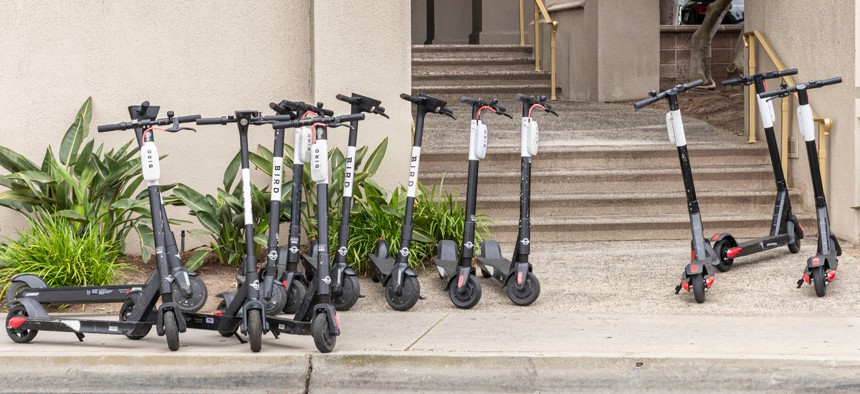Connecting state and local government leaders
A new mobility technology company called Tortoise promises to bring semi-autonomous scooters and e-bikes to market. Why?
Like some sort of catchy techno-pop mashup, self-driving scooters are now trending in the dancehalls of micromobility. Uber has said that it’s developing robotic versions of its dockless scooters and bikes currently operating in cities around the world. Manufacturer Segway has a three-wheeled trike that can be driven remotely. And a startup called Shared is pursuing a self-driving prototype of a moped-like electric conveyance.
Add another tune to the medley: A technology startup called Tortoise launched today, focused on “low-speed autonomy” for shared scooters and e-bikes.
Tortoise isn’t an e-scooter company. Rather, it builds technology that combines self-driving and remote-controlled features that can be integrated into any type of shared, dockless vehicle. The pitch is that this will allow the rentable scooters and bikes that are currently scattered around cities to self-deploy where needed to more readily match supply to demand, simplifying retrieval, charging, and replacement. Moving the vehicles around without direct human intervention would ease a major logistical pain for companies, and cut down on street and sidewalk clutter for cities.
“The days of going on a wild-goose chase to find an electric scooter or bike are over, writesTortoise’s co-founder and CEO Dmitry Shevelenko in a blog post, “because they’ll now come right to you.”
Well, not “now,” exactly. Tortoise-equipped devices are not steering themselves around major cities yet. But the startup has partnered with the city of Peachtree Corners, Georgia, to test how its such vehicles can ease lunchtime congestion near a local tech incubator and employment center, and it plans to roll out its devices there and in two European cities in November, according to a PR representative. In the video below, an unmanned Tortoise scooter performs unhurried, self-driving laps on a patio in Berlin. This in itself appears to be something of a feat, since the tall, two-wheeled vehicles tip over so easily; Tortoise has added a set of “robotic training wheels” for balance.
Another tele-operated scooter demo, this time from startup @TortoiseHQ
— Edward Miller (@TweetEdMiller) October 1, 2019
Retrofitted onto existing scooter, powered by a @Raspberry_Pi, camera and microcontroller.
They will offer the service for a fixed price per month to save on operations cost and prevent urban clutter.#MME pic.twitter.com/b4ULsvkG73
Should the scooter get knocked over, thanks either to human-on-robot aggression or some other road hazard, the Tortoise is no more able to right itself than its reptilian namesake, a PR representative confirms: “The system would automatically ping the operator letting them know human intervention is required. Because we’ll be optimizing for smooth routes with not a lot of foot traffic (when possible) the hope is that this isn’t as huge of an issue as it currently is with scooters.”
The scooter’s stately pace (hence the name Tortoise) is a big part of the package. In his post, Shevelenko explains that the company works with cities to determine where scooters can safely and slowly maneuver from wherever they’ve been left to where they ought to be—think middle of the street to a public transit hub, via a route of empty sidewalks or alleys. Right now, Tortoise employees and contracted tele-operators in Mexico City are responsible for monitoring the pathways via a camera attached to the device.
Of the many challenges associated with the future of robotic scooters, skepticism from city officials—and acceptance by the pubic—might be up there with technological hurdles. With some major cities having banned electric scooters, and others where sidewalk delivery robots are verboten, it’s not clear that city councils will embrace this opportunity to welcome two-wheeled sidewalk zombies. Meanwhile, the appeal of scooter vandalism and theft would seem even more enticing when the device is laden with valuable autonomous gadgetry. (For reference, Segway’s prototype robo-scooter will cost about $1,000 more than its human-piloted offerings.) As with the autonomous garbage can that was recently the target of much internet mockery, it remains to be seen whether scooting and self-driving are two technologies that truly belong together.
But Tortoise is betting that cities will want a solution to the safety and aesthetic concerns arising from sidewalk clutter, which are the main reasons for those bans anyways. And it expects that mobility startups are eager to ease the super-costly operational challenges of recharging, repairing, and rebalancing their fleets, which currently require gigantic support crews or amateur “bounty hunters” chasing financial incentives. In 2018, one of the largest players, Bird, spent close to half its gross revenue per ride paying contractors to charge its e-scooters, and another 14 percent of that revenue for repairs.
Taking paid human workers out of that equation could save a lot of money; already, Tortoise is working with several scooter manufacturers and active fleet operators, including Go X and Shared, to put its product on the streets.
But in the fast-moving world of mobility technology, and with considerable challenges likely awaiting this particular product, it’s reasonable to wonder whether Tortoise isn’t just another well-funded flash in the pan. And it is a sign of the times in another way: Given the questionable business model of the scooter companies (and so many other consumer tech companies that cater to young urbanites), executives are far more focused on actually making money than they have been in the past. “2018 was about scaling,” Travis VanderZanden, the founder and CEO of Bird, said at a conference in January. “2019 is about really focusing on the unit economics of the business.”
Laura Bliss is CityLab’s West Coast bureau chief.

NEXT STORY: States Fail to Step Up for Natural Gas Storage Safety Program



